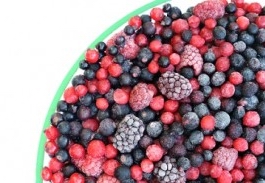 new outbreak of a hepatitis A strain rarely seen in the Western Hemisphere is believed to be associated with frozen mixed berries purchased from Costco is being investigated by multiple agencies, including the federal Centers for Disease Control and Prevention in Atlanta. At least 30 illnesses are involved, including sicknesses in Arizona, California, Colorado, New Mexico, and Nevada.
new outbreak of a hepatitis A strain rarely seen in the Western Hemisphere is believed to be associated with frozen mixed berries purchased from Costco is being investigated by multiple agencies, including the federal Centers for Disease Control and Prevention in Atlanta. At least 30 illnesses are involved, including sicknesses in Arizona, California, Colorado, New Mexico, and Nevada.According to the Colorado Department of Public Health & Environment, Townsend Farms Organic Antioxidant Blend frozen berries purchased from Costco appear to be the source of this outbreak.
The outbreak strain has been identified by CDC as hepatitis A virus (HAV) genotype 1B, a strain that circulates in North Africa and the Middle East. It was associated with last year’s outbreak in Europe involving frozen berries and another in British Columbia involving frozen berry blend with pomegranate seeds from Egypt.
According to the label, The Townsend Farms Organic Anti-oxidant Blend frozen berry mix associated with illness contained pomegranate seeds and other produce from the US, Argentina, Chile, and Turkey. The product is a blend of cherries, blueberries, pomegranate seeds, raspberries and strawberries. Costco has removed this product from its shelves, but has not yet issued a formal recall.
The U.S. Food and Drug Administration (FDA) is investigating the product, including testing berries for the Hepatitis A virus, which may take several weeks.
Colorado public health officials say three women and two men in the state, from ages 35 to 71, were stricken with hepatitis A. They are from Adams, Boulder, Clear Creek and Jefferson Counties. The state has asked people to discard the berry product if they have it in their freezers.
The risk of contracting hepatitis A from eating these berries is low, according to the Colorado public health warning. “However, if you have eaten Townsend Farms Organic Antioxidant Blend frozen berries during the past 14 days, contact your medical provider for an immunization. If you do not have a medical provider, contact your local health department,” advises the health department.
The hepatitis A vaccine can prevent infection if given within 14 days of exposure. Some people should receive immune globulin instead of the hepatitis A vaccine.
If you ate the affected berries within the past 14 days, please discuss with your doctor whether you should receive the hepatitis A vaccine or immune globulin. If you have received the hepatitis A vaccine in the past, you do not need to be revaccinated.
If it has been more than 14 days since you have eaten these berries, the vaccine won’t be effective preventing infection. Please monitor for symptoms and contact your physician if you become ill.
Early signs of hepatitis A appear two to six weeks after exposure. Symptoms commonly include mild fever, loss of appetite, nausea, vomiting, diarrhea, fatigue, pain in the upper right side of the abdomen, dark urine and jaundice (yellow eyes or skin). It is very important if you have these symptoms that you do not go to work, especially if you work in food service, health care or child care.
The disease varies in severity, with mild cases lasting two weeks or less and more severe cases lasting four to six weeks or longer. Hepatitis A infection can be severe and can result in hospitalization.
Some individuals, especially children, may not develop jaundice and may have an illness so mild it can go unnoticed. However, even mildly ill people can be highly infectious. People with symptoms suggestive of a hepatitis infection should consult a physician immediately, even if symptoms are mild.
Hepatitis A virus is spread via the fecal-oral route, and may be transferred from person to person through close contact or through food handling. Contaminated food or beverages commonly spread the virus. People are at increased risk of acquiring hepatitis A when they have been in close contact with an infected person.






